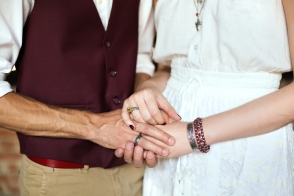By Rev. Kate Braestrup
We, the member congregations of the Unitarian Universalist Association, covenant to affirm and promote: journeying toward spiritual wholeness by working to build a diverse multicultural Beloved Community by our actions that accountably dismantle racism and other oppressions in ourselves and our institutions.
Yesterday, I met with a sweet pair of twenty-somethings to plan the wedding ceremony they have asked me to perform. The subject of vows arose. Should they write their own, they asked anxiously, or is it okay to just use traditional vows?
“Traditional vows are fine,” I said, smiling.
I’ll confess: I’m not a huge fan of original vows for a few reasons.
One is aesthetic: if they are vows at all (rather than gooey, hyperbolic love letters read out loud) original vows generally end up saying what the traditional vows do, only less eloquently.

The other reason, however, is that insofar as original vows are genuinely original, they are nearly always time- and- situation-dependent. Not just “I’’ll bring you coffee every morning” but also “I’ll never lie to you” and “I’ll always support your dreams.”
What one can reasonably promise to a young, strong, sane, happy and healthy lover may not be what one is called to offer when that same spouse is sick, elderly, senile, alcoholic, comatose or psychotic.
Bad things happen. And “love,” “honor” “cherish” and “be faithful” will always apply.
Right now, everyone in UU-land is obsessed with race and racism and anti-racism, white supremacy lingering and black lives mattering. These things are important. They are not, however, timeless.
There will come a day when anti-racism won’t seem quite so urgent.
This could be because some other problem looms larger—-hard to imagine, I know, but if Al Gore is right this time around, and New York City is under water in five years, or if the North Koreans fire a nuclear missile at Sacramento, “dismantling” the subtler manifestations of toxic whiteness among earnest middle-class UUs might not seem like our most pressing concern.
But the other possibility is that presumably the massive effort being made by the UU Powers That Be has at least some chance of being efficacious. Right?
I know, there will always be “oppressions” to address.
No doubt we will always be able to find someone who is, or claims to be, “oppressed.” That word —-like “racism,” “phobia,” “violence” and “harm”—-has already gotten slippery through overuse: do we truly wish to be bound by a UU Principle to take all such claims seriously?
Moreover, given that not every “oppression” is cultural, “diverse multiculturalism” will not always and everywhere be the remedy. Even now, female UUs have pointed out the many ways that sexism continues to have an impact on UU life and polity; the problem is not that there aren’t enough women in the pews nor that, say, white women somehow don’t belong to the same culture as white men.
The seven principles we currently agree upon are, like traditional wedding vows: broad, inclusive and sufficiently elastic to cover a wide variety of actual and potential, present and future circumstances. The eighth is more like an original vow, composed under duress.
Write it… or else the bride will bolt and the wedding will be canceled! Oh, and we already paid the caterer $5 million!
The first principle—-the inherent worth and dignity of every human person—-not only covers the same ground as the proposed eighth, it allows for the happy prospect that one day we UUs will look around and see that all the yelling, marching, banner-posting and sign-waving has worked its intended miracle. Diverse multiculturalism has been accomplished and racism along with all the other -isms we presently protest has been “crushed,” “dismantled” and “F***ed.” Ours is a hopeful faith, is it not? We may even find ourselves in a world, or at least a denomination, in which “oppression” has been well and truly crushed, and we can move on to the dismantling of “inconvenience,” “discontent” and “ennui.”
The first principle will still apply.
Copyright 2017 © Kate Braestrup



Thank you for this well-written piece. I have only one comment: “Right now, everyone in UU-land is obsessed with race and racism and anti-racism, white supremacy lingering and black lives mattering.” Not everyone. I am not obsessed. I am not even interested in this dialog.
LikeLiked by 3 people
It isn’t a very interesting subject, at least as presented by our betters in Boston. Perhaps because it isn’t really a dialogue in any real sense?
LikeLiked by 1 person
The “dialogue” is being constrained and restricted by social controls. I am writing a comment along those lines which I hope to send to this blog in a day or 2.
LikeLiked by 2 people
I almost agree with this general idea, and I may someday wholly agree, but I find the wedding vow example clunky and unconvincing. Wedding vows are actually an excellent example of a case in which the impulse behind rewriting traditional language in order to correct an unjust -ism and make it more inclusive was absolutely necessary. Wives traditionally had to vow to obey their husbands. That was not timeless or elastic, that was sexist.
LikeLiked by 1 person
Well, I’m using “traditional” to mean the modern traditional, not the ones that have “obey” in them.
LikeLiked by 1 person
Yes, I figured you wouldn’t use those vows, but I think “modern traditional” is an oxymoron.
LikeLiked by 2 people
My point is that “traditional” wedding vows have already changed and been rewritten. And people objected back then too, using these same kinds of arguments. At that time equal vows were bowing to modernity and the special interest of feminism vs the timeless notion of male/female complementarity in marriage. IMO it is only in retrospect that we know better what is timeless and what is not. (And the culture at large is only very recently and partially there. Lots of people still think that traditional marriage is only between a man and a woman, that this is right and proper and timeless because of the different but complementary roles of the sexes.)
I think it’s at least possible that in 100 years we will look back and wonder why it took us so long to take a “timeless” stand against racial and other oppressions.
On the other hand, adding an entire principle is a much bigger change than simply removing one offending word. So I can see the point made here, too. Maybe it *is* overkill to make such a large change to the principles, and that is what they will be thinking in 100 years. In which case, they can rewrite it again then.
I actually pretty much agree with you, in principle (ha ha—pun intended) but I don’t think marriage is a good example to illustrate the point. Marriage has been very changeable over the centuries. I was thinking maybe something like birth or baptism or coming of age ceremonies might be a little more “timeless.” But maybe not. I’d have to give it more thought to come up with a better example.
LikeLiked by 2 people
And, while I think this is a worthwhile conversation, we should also be aware that the 2017 General Assembly authorized the Board of Trustees to appoint a commission to reconsider the entire covenental section of the bylaws, including the Principles and Sources. The process was given a three-year window, if I remember correctly. The thinking is that there’s not a real covenant there — no there there.
LikeLiked by 1 person
Sorry, I don’t understand what you are saying. Is this commission reconsidering all the current (“traditional”) by-laws and sources? Or reconsidering the proposed new ones? Where is there no there there?
LikeLiked by 1 person
If you look at the bylaws https://www.uua.org/sites/live-new.uua.org/files/uua_bylaws_2015.pdf you’ll see that, especially in the first three or four articles, many of the sections begin with what seems to be an arbitrary letter “C.” As explained at this year’s GA, that stands for “covenant.” Those “C” sections are supposed to define the covenant between the UUA and congregations and affiliated organizations. The principles are included in that, and the commission (if I understand correctly) is looking at it all — everything that has a “C” before the section number). The proposed Eighth Principle was never actually proposed because that commission will be looking at all of it anyway. A difference of opinion about the wording of the first Principle was tabled for the same reason.
Any bylaw change, of course, is subject to the rules and processes in the bylaws, so it won’t be done without some due process, but changes to be proposed by the commission may go far beyond adding one principle. There is real disagreement about what it should mean to be a UU church, and what it should mean to be a UU.
LikeLiked by 1 person
I would be keeping an eye out for a move toward having the UUA determine more of UU polity and dogma. At the moment, they do it at the level of “Fellowship” for UU Ministers. Our congregations do the actual ordination. My guess is that there will be a push to take ordination out of the hands of congregations and make “Fellowship” a requirement rather than an add-on.
To wit: All UU seminarians are now supposed to receive training in what amounts to political correctness. “The requirement, or “competency” will familiarize seminarians with issues related to reproductive health, gender identity, sexual orientation, domestic violence, sexual assault, and sexual ethics and safety within congregations. Ministerial candidates will have to demonstrate knowledge in these areas when they go before the Ministerial Fellowship Committee, the body charged with the formation and credentialing of UU ministers.
All ministerial candidates are expected to show a basic knowledge in 16 subject areas before they appear before the MFC. These 16 competencies include church history, worship, pastoral care, antiracism, anti-oppression and multiculturalism, and religious education. The human sexuality competency was added at the MFC’s December 2009 meeting.”
Three guesses as to what “knowledge” will need to be “demonstrated” when it comes to anti-racism, anti-oppression and multi-culturalism?
LikeLiked by 3 people
And at the member level, watch for new language that will sound more like a creed that theoretically makes a more positive and unifying statement about who we are. And I do mean theoretically. One of us ought to do a post on this.
LikeLiked by 2 people
Oh dear! One reason I have not been as upset as Mel about recent UUA developments is that I have attended and attend now churches that don’t seem to have a whole lot to do with the UUA on a daily basis. My church had a post-service information session about what went on at GA one Sunday, and that was it. We didn’t take part in the “white supremacy teach-in” We do talk about social justice and political activism, but these are separate email lists and groups that meet outside of worship time. So if it’s not your thing and you come for the spiritual aspects of church (or the music—that’s me), you can just do that. This stuff sounds like it will make it harder for churches like ours to just do their thing 😦
LikeLiked by 1 person
That’s exactly what some in the UUA want — to make it harder for churches like yours to do their thing. But it’s not over until the however-weighted lady sings. We’ll have to see how the process goes and how truly democratic and open-minded it is.
LikeLiked by 2 people
K.L. how wonderful! Bravo for your church, and may they keep it up. That’s how it should be, IMHO.
LikeLiked by 1 person